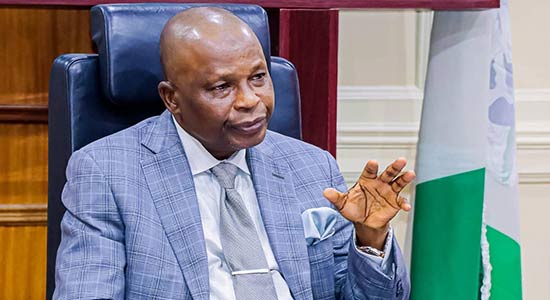Attorney General of the Federation and Minister of Justice, Prince Lateef Fagbemi(SAN), has expressed concern over the reported cases of conflicting court judgements among High Court of Judges in the country.
Fagbemi who spoke with journalists during a chat on Tuesday in Ilorin, Kwara state capital on the sidelines of the ongoing three-day conference of the Justice Sector Reform Committee Teams in collaboration with Federal Ministry of Justice however said that, “The issue of conflicting judgement was a recurring decimal but you find in recent times that has stopped and efforts are being made to address this issue”.
The conference was also supported by the European Union-funded Rule of Law and Anti-Corruption (RoLAC II) Programme of the International Institute for Democracy and Electoral Assistance (International- IDEA).
According to him, “What use to happen was the effect of fundamental cause and you cannot continue to treat the effect in order to cure the cause rather it’s the cause that you have to look at – technology, over zealousness on the part of some litigants”.
He said that, “some unscrupulous lawyers would not bring to the attention of the court that there have been a decision that every lawyer has a responsibility to bring out cases that are even against him.
“I as the Attorney General, I’m ready to complete this and I know that the leadership of the Nigeria Bar Association has also keyed into this and we need to put a stop to all these.
“I’m also aware that the judiciary itself has set up a panel to look at how to forestall future recurrence, including imbibing what I will call technology so that if a case was given in Zaria for example, the man in Lagos will easily see it. Apart from that, when you file a suit, you are supposed to disclose the right suit now, that no previous case file by you. If you fail to do that your case will be dismissed”.
On the conference, Prince Fagbemi stated that, “the pursuit of justice lies at the heart of our collective aspirations for a fair and equitable society.
“It is a fundamental pillar upon which the rule of law rests, and it is essential for the maintenance of peace, stability, and social cohesion”.
He added, “However, as we gathered here today, we do so against the backdrop of persistent challenges that continue to hinder the effectiveness and accessibility of our justice system.
“As you are aware, the reform of the justice sector is at the heart of this administration’s developmental blueprint.
“You may recall that one of the cardinal items on our Renewed Hope Agenda as an administration, is to drive judicial reforms to achieve sustainable socio-economic growth and investment, facilitated by rule of law, and to address the challenges militating against the administration of justice in our country.
“Accordingly, the Federal Government is committed to addressing challenges in our justice system, through strategic policies and other mechanisms that have direct impact in improving democratic norms, including the rule of law, access to justice and minimum standards for the enforcement of human rights.
“In furtherance of these objectives, we have undertaken a number of reformative initiatives that drive critical reforms in the sector.
“For instance, I recently inaugurated the Presidential Committee for the Review and Update of the Laws of the Federation of Nigeria (LFN) 2004 to identify obsolete laws and take steps to update and consolidate our laws.
“Furthermore, with the support of all stakeholders, the National Policy on Arbitration and National Policy on Justice have been developed as blueprints that outline the desired reforms in the Justice Sector.
“It is pertinent for me to state also that at the heart of our reform agenda in the justice sector is the National Policy on Justice, which identifies the root causes of the failures and inadequacies of the justice system, and its adverse impact on the nation.
“The policy seeks to consolidate on various reform efforts and achieve inter-agency (institutional) cooperation and coordination. Its purpose is to achieve a consensus amongst stakeholders for driving holistic development of all processes, or components of the Nigerian justice system.
“We clearly recognize that Nigeria practices a federal system of government, which envisages a synergetic relationship between the center and the sub-nationals otherwise known as federating units.
“It is on this basis that we continue to engage with our colleagues from the States, in order to come up with uniform strategies to address our common challenges.”
Also speaking at the event, Kwara State governor and Chairman, Nigeria Governors Forum(NGF), Alhaji AbdulRahman AbdulRazaq, lauded the federal government on the present effort to rejig the justice system in the country.
He said, “On behalf of the government and people of Kwara State, I welcome the Honourable Attorney General of the Federation and Minister of Justice, my lords the Chief Judges, State Attorneys-General, and all esteemed members of the Network of Justice Sector Reform Teams to Kwara State for this biennial conference.
“I also thank you for the choice of our state as the host of this important gathering”.
Abdulrazaq added, “This conference couldn’t have come at a better time as President Bola Ahmed Tinubu mobilises the Honourable Attorney General and his team to rejig the system for better outcomes.
“I have confidence that the JSRT will address all pending issues on judicial reforms from a position of knowledge and patriotism, and in a way that strengthens public confidence in the judicial system”.




